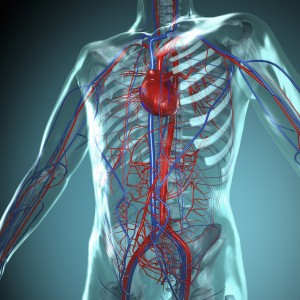 An international team of researchers revealed complex networks underlying cardiovascular diseases based on genome-wide studies, genetic variants, gene expression and disease phenotype. The study was published in the journal Circulation and is entitled “Integromic Analysis of Genetic Variation and Gene Expression Identifies Networks for Cardiovascular Disease Phenotypes.”
An international team of researchers revealed complex networks underlying cardiovascular diseases based on genome-wide studies, genetic variants, gene expression and disease phenotype. The study was published in the journal Circulation and is entitled “Integromic Analysis of Genetic Variation and Gene Expression Identifies Networks for Cardiovascular Disease Phenotypes.”
Cardiovascular disease (CVD) corresponds to a group of diseases that affects the heart and/or blood vessels, like stroke, coronary heart disease and hypertension. CVD is the leading cause of death worldwide, and can be caused by several factors, including environmental, genetic and lifestyle.
Several genome-wide association studies (GWAs) have identified a considerable number of single nucleotide polymorphisms (SNPs), which correspond to a difference in a single nucleotide in DNA. SNPs are the most common type of genetic variation and they occur on average in every 300 nucleotides, meaning that there are approximately 10 million SNPs in the human genome. The majority of SNPs have no effect on health, however, when they are present within a gene or a regulatory region, they may affect gene function and play a role in disease development. Several SNPs have been associated with CVD, although the role played by the majority of these genetic variants in disease is not clear.
Researchers have built a CVD network based on GWAs results with 1,512 SNPs associated with 21 CVD traits. Two traits were connected in case they shared the same SNP. These SNPs were then compared to whole blood gene expression profiles of 5,257 participants in the Framingham Heart Study, a long-term, ongoing study focused on cardiovascular features of inhabitants of Framingham in Massachusetts. This integration allowed the team to determine the relationship between genetic variants, gene expression, and CVD phenotypes.
Several SNPs were identified associated to altered gene expression, and to be related to CVD traits. Researchers also found associations between SNP-gene expression and CVD risk factors such as lipids, fasting blood glucose, blood pressure, and body mass index. Furthermore, a subset of SNPs, previously reported to be associated with CVD phenotypes in GWAs, was also found to potentially exert their role by altering the expression of specific genes (e.g., PCSK7 and LDLR), promoting inter-individual genetic variation in CVD phenotypes.
The researchers concluded that their CVD network integrating GWAS SNPs, gene expression analysis, and phenotype data provided evidence of the shared genetic foundations of CVD and its risk factors. In addition, it also identified biological pathways that may offer potential novel therapeutic targets for prevention and treatment of CVD.


